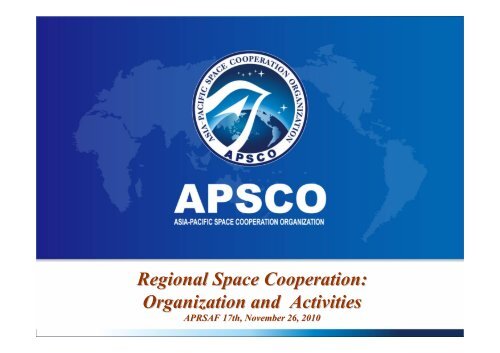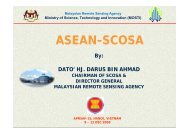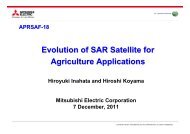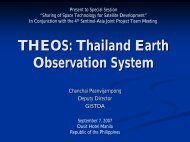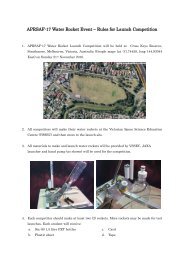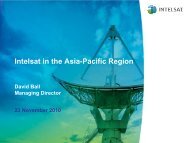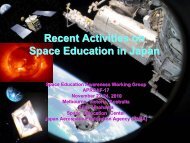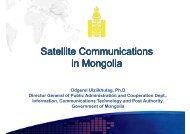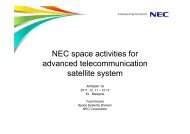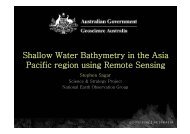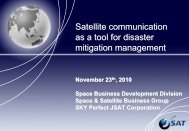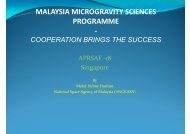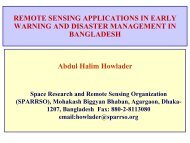APSCO - APRSAF
APSCO - APRSAF
APSCO - APRSAF
- No tags were found...
Create successful ePaper yourself
Turn your PDF publications into a flip-book with our unique Google optimized e-Paper software.
Regional Space Cooperation:Organization and Activities<strong>APRSAF</strong> 17th, November 26, 2010
• About the Organization• Space Activities and Cooperation2
• The Initial Proposition-1992In the November of 1992, the Asia-Pacific Workshop on Multilateral Cooperation inSpace Technology and Applications was held in Beijing.China, Pakistan and Thailand proposed the institutionalization of the mechanismwhich was agreed by the participants from 16 Asia-Pacific Countries.3
On June 1st of 2006, the representative of the Governmentof Turkey signed the <strong>APSCO</strong> Convention in Beijing.9 Signatory Countries.5
•The Establishment of <strong>APSCO</strong>-2008• On December 16thof 2008, theInaugurationCeremony of<strong>APSCO</strong> was held inBeijing, China.6
The Structure of <strong>APSCO</strong><strong>APSCO</strong> COUNCILSecretary-GeneralDepartment ofExternal RelationsAnd Legal AffairsDepartment ofStrategic PlanAnd ProgramManagementDepartment ofEducation/TrainingAnd DatabaseManagementDepartment ofAdministrationAnd Finance7
The Chair-board of <strong>APSCO</strong> CouncilChairman of the Council: Mr. Thaneerat Siriphachana (Thailand),Vice-Chairmen of the Council: Mr. Kamrul Hasan (Bangladesh),Mr. Chen Qiufa (China).Mr. Kamrul Hasan (Bangladesh)Mr. Thaneerat Siriphachana (Thailand)Mr. Chen Qiufa (China).8
The SecretariatSecretary-General:Dr. Zhang Wei (China)Director-General of Departments:Mr. Ahmad Talebzadeh (Iran)Dr. Maqbool Ahmed Chaudhry(Pakistan)Mr. Tsoodol Nyamkhuu(Mongolia)Ms. Liu Xiaohong (China)9
Current Status of <strong>APSCO</strong>• International Recognition<strong>APSCO</strong> is drawing more international attention. It has been granted as apermanent observer by the United Nations Committee on the Peaceful Usesof Outer Space (UN-COPUOS) on the 52nd Session of Committee meetingin Vienna, on 12 June 2009.10
Current Status of <strong>APSCO</strong>• Host Country AgreementDr. Zhang Wei, Secretary-General of <strong>APSCO</strong> and Mr.Li Yizhong, Minister ofMinistry of Industry andInformation Technologyof China signed the HostCountry Agreement on 15July 2009 inBeijing,China.11
HeadquartersIn November of2009, <strong>APSCO</strong> movedinto its new headquartersoffice building, which islocated in Beijing anddonated by ChineseGovernment.12
Member-State Space Achievements Exhibition• The Exhibition of Member StateSpace Achievements was held atthe <strong>APSCO</strong> Headquarter fromDecember 2009.13
•The First Council Meeting in 2008On December 17-18 of 2008, ministerial-level representativesfrom 9 Signatory Countries, along their delegations attendedthe First Council Meeting of <strong>APSCO</strong>.14
The Second Council Meeting in 2009• Ministerial-level Councilmeeting is held in Beijingduring 17-18 Decembers,200915
The 3 rd Council Meeting of <strong>APSCO</strong>September 16 th -17 th , 201016
Space Activities and Cooperation17
Fields of Cooperation•Article 6 of the Convention of <strong>APSCO</strong>• Space technology and programs of its applications;• Earth observation, disaster management, environmentalprotection, satellite communications and satellitenavigation and positioning;• Space science research;• Education, training and exchange of scientists/technology;• Establishment of a central data bank for development ofprograms of the organization and dissemination oftechnical and other information relating to the programsand activities of the Organization.• Other cooperative programs agreed upon by the MemberStates.18
The Activities of <strong>APSCO</strong>• Education and Training Program• Training Course on Remote Sensing Technology and Applications forMongolia / Indonesia held in May 2005, Beijing .• Training Course on Satellite Technology and Spacecraft Project Management held inJune 2005, Beijing.• Training Course on Reception Stations of FY Satellite Data Broadcasting System (DVB-S) held in July 2006 in Beijing.• Training Course on Space Technology Applications held in 2007, Peru.• Nine-Month Master Program on Space Technology Applications held from 10 July2006 to 10 April 2007, Beijing.19
Training Course on:Data Processing and Applications on Remote Sensing SatelliteMay 11-22, 2009, Beijing20
Training Course on GNSS and its ApplicationsJune 4-22, 2010, BeijingCo-sponsored by Ministry of Industry and Information Technology (MIIT) of Chinaorganized by Peking University21
Master Program on Space Technology Application(MASTA 2008 and 2010) for <strong>APSCO</strong> Member States<strong>APSCO</strong> supported by The Beihang University of China jointly holdthe Master Program on Space Technology Application, which startsfrom September 2010. (Graduation Ceremony of MASTA 2008)22
Workshop/SymposiumThe First International Symposium onSpace Cooperation for the Asia-Pacific RegionJuly 20-24, 2009,Thailand23
Workshop/Symposium24
•Space Cooperation - DVBSDonation Ceremony of Reception Stations of FY Satellite Data BroadcastingSystem (DVBS)to 7 Signatory States to <strong>APSCO</strong> Convention by the ChineseGovernment was held on 24 March in Beijing .25
•Space Cooperation - SMMSOn September 6th of 2008, 30 delegates from 9 SignatoryStates witnessed the Launch of the Environment and NaturalDisaster Monitoring Satellite (HJ-A, also named as Small Multi-Mission Satellite ) at Taiyuan Lunching Center.26
Space Cooperation –KABES/SMMS Receiving Station in ThailandIn December of 2008, the Commissioning of KABES/SMMS ReceivingStation in Thailand.27
• Space Cooperation - Ground Station in Thailand• On 21 December 2009 ,underthe Cooperation Framework of<strong>APSCO</strong>, Center for ResourcesSatellite Data andApplications (CRESDA)signed the agreement with theGovernment of Thailand, tobuild the Receiving Station ofSMMS Satellite in Bangkok.28
•Projects approved by the Council Meetings(1) Establish the Spatial Data Sharing Service Platform andIts Application Pilot Project;(2)Proposal for <strong>APSCO</strong> Applied High Resolution Satellite Project;(3)Research on Atmospheric Effects on:(i) Ka Band Rain Attenuation Modeling;(ii) Ionosphere Modeling through Study of Radio WavePropagation and Solar Activity;(4) Development of Asia-Pacific Ground Based Optical SatelliteObservation System (APOSOS);(5) Feasibility Study of the Applications of Compatible NavigationTerminal System;(6) Short-term Training Course on Satellite Technologies(7) Telecommunication Satellites(8) Small Student Satellites joint development among University of MS29
Space Cooperation –The feasibility study ofprojects by experts of MS30
Data Sharing PlatformSystem DescriptionNormal UserInternal UserSystemAdministrator1.User Service andInformation Release2. 3. Distributed Internal Operation Retrieval AssistantSubsystem SubsystemsPortal of Data Information Service SystemUser Service andInformation ReleaseSubsystemInternal OperationAssistant SubsystemDistributed RetrievalSubsystem4. Data Management SubsystemData Management SubsystemSpatial DataDocument Data31
Remote Sensing Satellites (APRS)General structureSatellitsTT&CTask schedulingData Data Receiving& ProcessingData SharingTraining32
Key Technical Topics-System Configuration and Specification1. Orbit parameters2. Imaging modes3. Mission Planning-Space Segment System Specification1. Payload2. AOCS3. Structure and Thermal Control4. Data Transmission System5. TT&C6. Propulsion7. OBDH ……...- Minimum Requirement Case(2 Meter H.R + WFI+HSI)Sat 1: Two 2/8mPan/MSI+HSISat 2: 2/8mPan/MSI+16mWFI33
Research on Atmospheric EffectsKa Band Rain Attenuation Modeling and Ionosphere Modelingthrough Study & Radio Wave Propagation and Solar Activity• Lead Country : Thailand• For Atmospheric Effects on Ka Band Rain Attenuation Modeling, theobjective is to develop the Ka-band rain attenuation model suitable formember states and compare it with current ITU-R model.• For Atmospheric Effects on Ionosphere Modeling through Study of RadioWave Propagation and Solar Activity, the objective is to develop theionosphere models based on the measured data from the radio wave atdifferent frequency reflecting from ionosphere due to solar activitysuitable for Asia-Pacific region.34
Asia Pacific Ground Band Optical SatelliteObservation System (APOSOS)Leading country: China and Turkey1. Objective: The basic objective is to build the network with existing facilities, with the aim offinding objects and space debris in orbit for research purposes.2. Benefit: This network will derive benefit from the wide geographical distribution of <strong>APSCO</strong>countries and sharing the data in participating countries.3. Schedule:APOSOS First MeetingAPOSOS Second MeetingFeasibility EvaluationAdministrative Meeting4 th Council Meetingfeasibility study plan (April 2010)draft report discussion (May 2010)current node condition analysisfinalized report discussionreport to the council for approval3535
4. Existing Infrastructures and Potential NodesUkraineMongoliaPakistanTurkeyIranChinaBangladeshPeruBrazilThailandIndonesia36
Application of CompatibleNavigation Terminal13 Proposed Projects●8 were concerned with the construction of navigation application systemDevelopment and Demonstration of the Applications of Compatible1GNSS Terminals for Emergency Management and Disaster Rescue2 Vessel Safety and Rescue Information SystemPublic Switching Platform for Key Commercial Vehicles Dynamic3Information4 Bridge Health and Safety Monitoring SystemBeiDou Yuheng Container Terminal Operations Monitoring and5Controlling System6 Dynamic Traffic Information Service SystemNetwork RTK system for the application of urban fundamental7construction8 Location Based Intergraded Work Safety supervision System37
4 were concerned with satellite navigation application technology andproduct R&D1Multimode navigation chips and navigation end productsapplied in compatible navigation systems2 Satellite Navigation Simulation and Test system3 LBS technology4 Software Compass/GPS Receiver1 project was concerned with the construction of satellite navigationaugmentation system1 <strong>APSCO</strong> Satellite Based Augmentation System38
Application SystemsAerospaceAstronautics DefenseMeasureMobileVehicleTiming39
More activities in near future• Study of the Training and Education Center of <strong>APSCO</strong>• Study of the Asia-Pacific Research Center of Space Law• MASTA Program of Degree Education for more than 45students in 2011-2013• Four training courses in remote sensing andcommunications fields in 2010 and 2011• The Third International Symposium of <strong>APSCO</strong> in 2010,on early worming of earthquake from space• UN/Thailand/ESA/<strong>APSCO</strong> workshop on Space Law inThailand in November 201040
Potential Cooperation Fields• Training, Education and Symposium• Research Projects and Optional Projects• Space Law and Regional Policy Research• Remote Sensing Data Sharing• Small Student Satellite Development• Long Term Space Development Plan•Others41
Thank You!42


